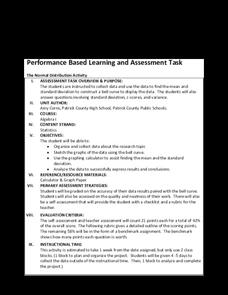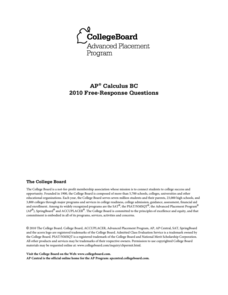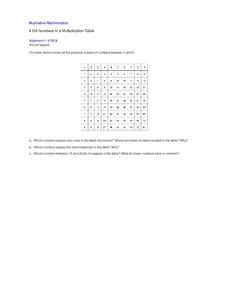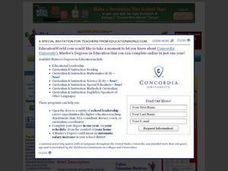Radford University
Got Slope?
Go around and around with slope. The class investigates tornadoes by watching videos, building a homemade tornado, and performing research on the Storm Prediction Center website. Groups gather data and create scatter plots for twisters...
Radford University
The Normal Distribution Activity
For whom does the bell fit? Pupils begin by working in groups gather data on three different variables. They then determine the mean and standard deviation of each data set and create bell curves. To finish, they answer guiding questions...
Arcademics
Swimming Otters
Otters swim through numerical gates carrying multiplication equations with a missing factor. By choosing the gate with the correct missing factor, players make the otter swim faster in the online game.
Curated OER
To the North: A Black Family Leaves Arkansas to Find Work in Michigan
Upper elementary and middle school scholars study the economic factors that caused so many Arkansans to migrate to different parts of the country looking for work. Use this history lesson plan to help your charges gain a better...
Indian Institute of Technology
Could King Kong Exist?
The title says it all: Could King Kong exist? Investigate how increasing the dimensions of an object affects its surface area and volume to mathematically conclude whether a creature with the weight and height of King Kong could actually...
Radford University
Parallel Lines, Transversals, and Angles: What’s the Connection?
Streets, bridges, and intersections, oh my! Parallel lines and transversals are a present in the world around us. Learners begin by discovering the relationship of the angles formed by parallel lines and a transversal. They then apply...
College Board
2010 AP® Calculus BC Free-Response Questions
What do a zoo, snow, and a moving particle have in common? The six free-response items from the 2010 AP® Calculus BC exam allow teachers and pupils see how items may show up in context. Three of the questions are from only the BC portion...
Insurance Zebra
Insurance Curriculum for Middle and High School Teachers
Liability, deductible, premium ... what do these words mean, and how do they relate to insurance? Scholars complete a pre-test, matching vocabulary activity, and insurance timeline worksheet and become familiar with these terms. Next,...
Illustrative Mathematics
Numbers in a Multiplication Table
Identifying patterns is a crucial skill for all mathematicians, young and old. Explore the multiplication table with your class, using patterns and symmetry to teach about square numbers, prime numbers, and the commutative and identity...
Curated OER
Math Madness: A Game for Small Groups
Students work together in groups and solve math problems accurately.
Curated OER
Groups of Ten Ones
In this place value worksheet, learners circle groups of "ten cubes" and write how many tens they counted all together. Students are grouping cubes in ten's.
Curated OER
Food Math
Learners brainstorm healthy food choices. In this health science instructional activity, students calculate how much of each food group they need daily. They plan a menu based on the "MyPyramid for Kids" food guide.
Curated OER
Heart Smart in a Heart Beat
As an introductory activity, young statisticians measure their heart rate at rest and after exercise and compute the mean and median, and create a box & whisker plot. This is followed by watching a video (that no longer seems to...
Curated OER
Homework 2: Grouping
In this grouping worksheet, students observe models of groups. They identify the number in each row, the number in each column and then identify the total in the group. This one-page worksheet contains four grouping problems.
Curated OER
Operation: Math
Students use critical thinking skills about math operations and practice using previously taught math skills. They solve a puzzle where they have to replace an * with the correct operation to complete the number sentence.
Curated OER
Unequal Groups vs. Equal Groups
Third graders create their own chenille stems to use during this and future lessons. As a class, they discuss the difference between equal and non-equal groups. In groups, they brainstorm a list of items that come in groups of two,...

















